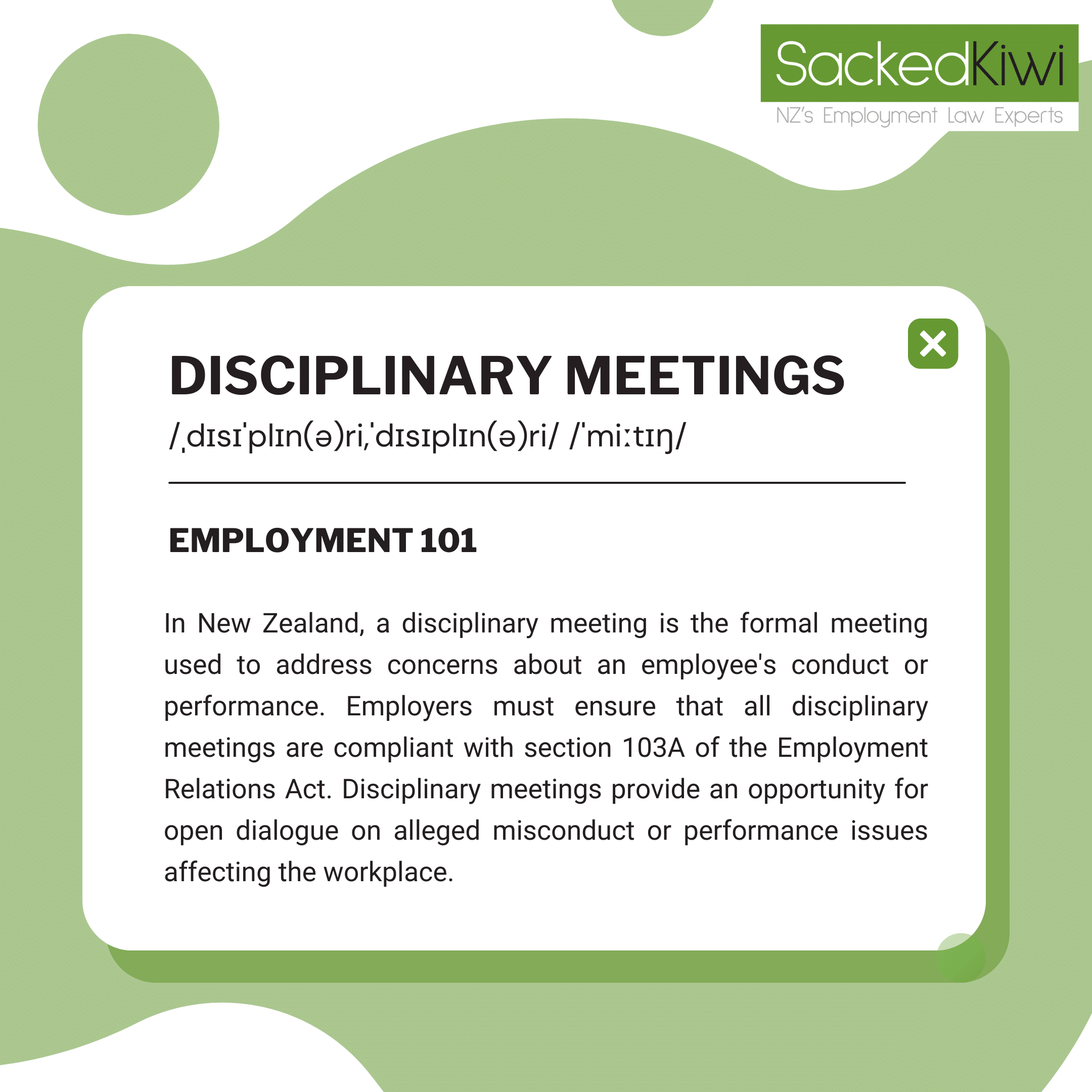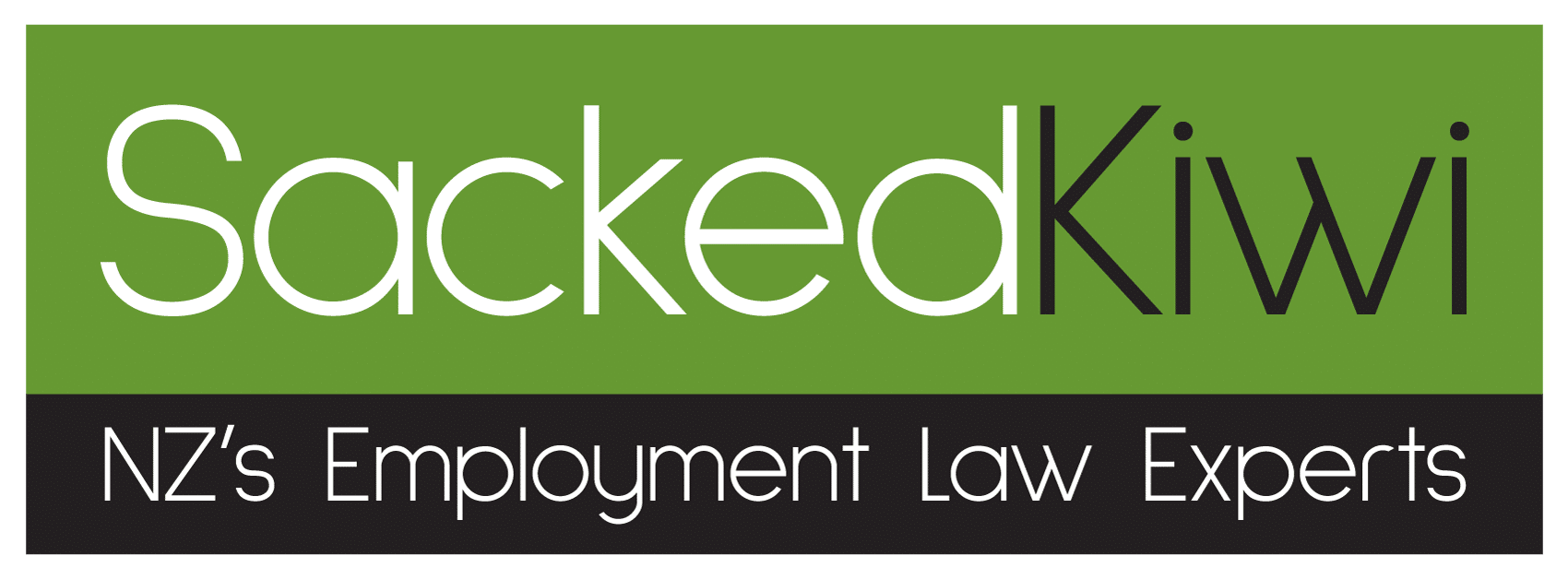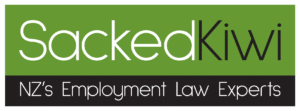
What is a Disciplinary Meeting?
In New Zealand, a disciplinary meeting is a formal meeting used to address concerns about an employee’s conduct or performance. Employers must ensure that all disciplinary meetings are compliant with section 103A of the Employment Relations Act. Disciplinary meetings provide an opportunity for open dialogue on alleged misconduct or performance issues affecting the workplace.
Employees have specific rights during these meetings, such as being informed about the allegations, having access to relevant evidence, and having a support person or representative present, as stipulated by New Zealand employment laws.
The objective of a disciplinary meeting is to resolve issues through constructive dialogue, which can lead to mutual understanding, corrective actions, or the implementation of disciplinary measures in line with company policies and legal requirements.
“I’ve been given notice of a disciplinary meeting at work” What does this mean?
Receiving notice of a disciplinary meeting at work is significant because your employer is formally addressing concerns about your conduct or performance. This meeting allows your employer to discuss their concerns with you and provides you with a chance to explain your perspective, present evidence, and discuss possible solutions or outcomes.
In New Zealand, employers are required to conduct disciplinary meetings with procedural fairness. This means you must receive adequate notice of the meeting, access to relevant information, and the right to have a support person or representative present during the meeting.
Understanding the implications of a disciplinary meeting notice is crucial. Depending on the outcome, your employer might issue a warning, recommend further training, or, in severe cases, contemplate termination of employment. It’s essential to prepare thoroughly, seek advice if necessary, and participate constructively in the meeting to ensure a fair and balanced resolution by New Zealand’s employment laws.
What is the disciplinary meeting process?
The disciplinary meeting process typically involves inviting the employee to a meeting where the concerns are outlined. The employee is given an opportunity to present their perspective and evidence, and the discussion covers potential solutions or consequences.
Employers must adhere to procedural fairness, ensuring the employee receives adequate notice of the meeting, access to relevant information, and the right to be accompanied by a support person or representative. Employers must also comply with the requirements of section 103A of the Employment Relations Act, which includes notifying the employee of the meeting, the allegations, and providing reasonable time to prepare. The notice should detail the issues, evidence, and potential outcomes.
It is crucial that employees are informed of the possible outcomes. At the end of the meeting, the employer must provide the employee an opportunity to explain the issues or allegations. The employer needs to listen to the explanation and then take time to consider the outcome.
Navigating the disciplinary meeting process according to New Zealand’s employment regulations is crucial. Seeking advice or representation is essential to ensure compliance and fairness throughout the disciplinary proceedings. Our legal experts can guide you through the complexities of the disciplinary meeting process. Get in touch with us for support.
Key Takeaways for Employees
- Receive Adequate Notice:
-
- You should be informed of the meeting details, including the date, time, and location.
-
- You should have reasonable time to prepare for the meeting.
- Understand Allegations and Evidence
- You should receive a clear outline of the specific allegations or issues against you.
- You should be provided with the evidence related to these allegations.
- You should be informed about the potential outcomes of the meeting.
- Ensure Procedural Fairness
-
- You should have the right to be accompanied by a support person or representative.
-
- You should have access to all relevant information before the meeting.
- Present Your Explanation
-
- You should have the opportunity to explain the issues or allegations from your perspective.
-
- Your explanation should be listened to, and the employer should take time to consider it before making a decision.
- Adherence to Legal Requirements
-
- The process should comply with section 103A of the Employment Relations Act.
-
- All procedural and fairness standards should be met to ensure a fair process.
What is disciplinary action in New Zealand?
Disciplinary action refers to measures taken by employers in response to employee misconduct or breaches of workplace policies or regulations. It is a formal procedure implemented to address and rectify issues such as poor performance, misconduct, or violations of company rules.
Disciplinary action in New Zealand is typically initiated following a fair and thorough investigation into the alleged misconduct. This process involves notifying the employee of the concerns raised against them and providing an opportunity for the employee to present their perspective before any decisions are made through a disciplinary meeting.
Employers in NZ are required to follow fair and transparent procedures during disciplinary proceedings, adhering to principles of natural justice and ensuring employees are treated fairly throughout the process. This often includes providing written notice of the allegations, holding meetings to discuss concerns, allowing the employee to bring a support person, and giving them the chance to respond to the accusations.
The severity of disciplinary action can range from verbal warnings and written warnings to suspension or, in serious cases, termination of employment. However, any disciplinary action taken must be reasonable and proportionate to the misconduct or breach.
Making sure you have adequate representation during a disciplinary procedure holds immense significance. You have the legal right to have a support person and legal representation throughout these proceedings. Our team of legal experts can provide guidance and support in understanding the complexities of disciplinary actions and meetings. Contact Us!
Where is a disciplinary meeting held?
Disciplinary meetings usually occur in a private setting within the workplace premises, ensuring confidentiality and focused discussions. While there’s no specific legal requirement for the meeting venue, providing a fair and appropriate environment is essential. In some cases, meetings can be arranged off-site if agreed upon by both parties, prioritizing privacy or neutrality. Top of Form
Key Steps as an Employee for a Disciplinary Meeting:
Disciplinary meetings are often the first step toward potential dismissal by an employer. What happens during these meetings is crucial for any future personal grievance claims regarding dismissal. The way the meeting is called, the process followed, and the reasons for the meeting are all essential in understanding if you have a solid claim for unfair dismissal later on. Clearly, disciplinary meetings are pivotal moments. Therefore, it is important to do the following when you receive your notice:
-
Record How You Are Invited to the Meeting
Take note of how you were informed about the meeting. Save any emails, letters, or messages as these can provide context and evidence.
-
Seek Legal Advice
Legal advice is key. Our team of employment law experts at Sacked Kiwi can provide guidance on your rights and help you prepare for the meeting.
-
Bring a Support Person
You have the right to have a support person or representative with you during the meeting. This can provide emotional support and help you keep track of the proceedings.
-
Remain Professional
Stay calm and professional during the meeting. Listen carefully, ask clarifying questions, and avoid getting defensive or confrontational.
-
Record Everything
Take detailed notes of what is said and any actions agreed upon during the meeting; recording it with audio is often a good move. Keep a record of all correspondence related to the meeting, including invitations and any follow-up communication.
By following these steps, you can ensure that you are well-prepared for your disciplinary meeting and better positioned to protect your rights and interests.
If you do end up getting dismissed, evidence of how your employer handled the procedure, including the disciplinary meeting process, is key to understanding if you have a claim for unfair dismissal. If your dismissal occurs due to procedural errors, improper grounds, lack of proper notice, or other violations of employment law, the evidence you collected will be crucial in making a solid case. Having comprehensive records can significantly strengthen your position and help you demonstrate any breaches of your rights effectively.
How Sacked Kiwi can help?
If you have been called to a disciplinary meeting or believe you were unfairly dismissed following one, it’s essential to understand your rights and the proper procedures. Filing a personal grievance involves lodging a complaint with the Employment Relations Authority, and Sacked Kiwi’s team of experts is ready to help you navigate this process.
Our experienced professionals can guide you through every step, ensuring you understand your rights, gather necessary evidence, and present a strong case. Contact us for support and guidance in filing your claim. Contact them here!
Legal Disclaimer:
The content posted on the Sacked Kiwis website should not be considered or relied upon as legal advice or opinion. The information presented here is not intended to serve as legal guidance. Over time, laws and regulations evolve, potentially altering the accuracy of previously shared information. Updates in jurisprudence or legislation, which could happen without immediate notice, may render the legal information on this platform outdated or obsolete.
Should you need employment advice, please don’t hesitate to contact us through our toll-free hotline.

